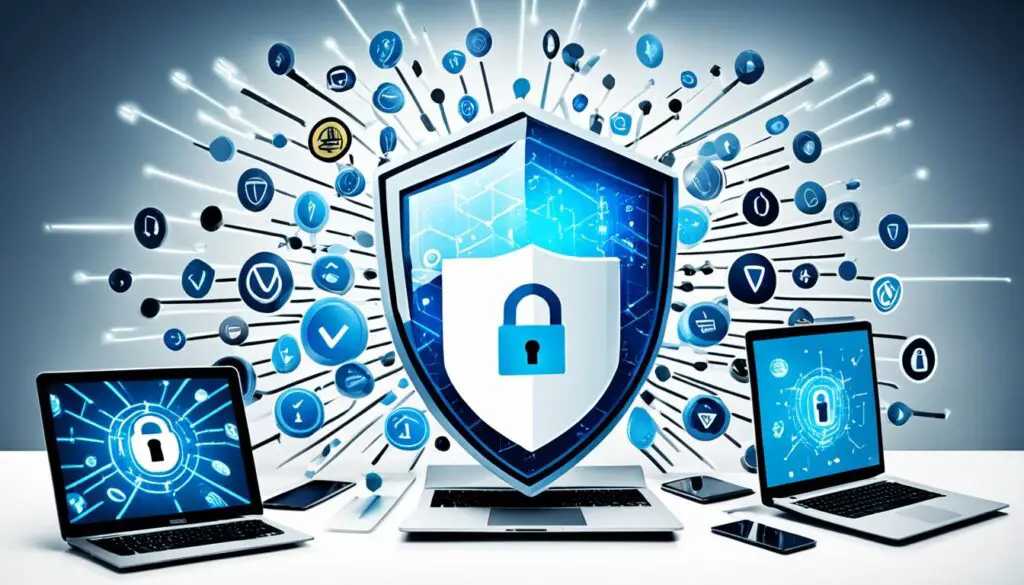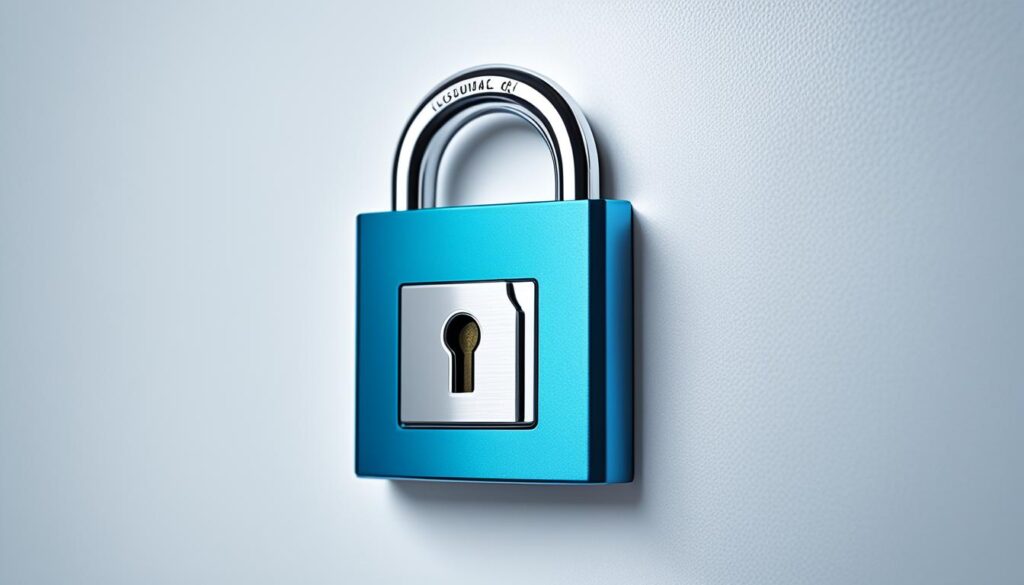
In recent years, with the advent of the digital age, the issue of copyright has become increasingly important. As a content creator or producer, it is crucial to understand the implications of digital copyright law and how to safeguard your creative work in the online realm.
The digital landscape presents unique challenges and opportunities for creators. With the ease of sharing and distributing content online, protecting your intellectual property has never been more vital. By exploring the essentials of digital copyright law, you can navigate the intricacies of this complex legal framework and ensure your work is properly protected.
In this article, I will delve into the foundations of digital copyright law, explaining its key principles, such as online infringement and fair use. I will also provide practical tips on how to protect your digital content through copyright registration, digital watermarking, and licensing agreements.
Join me as we explore the world of digital copyright law and empower ourselves to safeguard our creative endeavors in the digital age.
Key Takeaways:
- Understanding digital copyright law is essential in the digital age to protect your creative work.
- Key principles of digital copyright law include online infringement, fair use, and the Digital Millennium Copyright Act (DMCA).
- Taking proactive measures like copyright registration and digital watermarking can help safeguard your digital content.
- Establishing clear licensing agreements with third parties is crucial to protect your intellectual property.
- Regularly monitoring for potential infringements and enforcing your rights is necessary to safeguard your creative work online.
Understanding Digital Copyright Law
Digital copyright law plays a critical role in safeguarding creative works in the digital landscape. This comprehensive framework addresses various aspects, including online infringement, fair use, and the Digital Millennium Copyright Act (DMCA). As a creator, it’s vital to understand the rights and limitations surrounding digital copyright to protect your intellectual property online.
Exclusive Rights and Fair Use
Under digital copyright law, creators possess exclusive rights to reproduce, distribute, display, and perform their works. These rights provide essential legal protections and allow creators to control the use and dissemination of their content.
However, digital copyright law also acknowledges the concept of fair use. Fair use exceptions enable the limited use of copyrighted material for purposes such as criticism, commentary, and education. It allows for the balance between protecting creators’ rights and fostering creativity and innovation in society.
The Digital Millennium Copyright Act (DMCA)
The DMCA is a key legislative piece that strengthens the protection of digital copyrights. It establishes provisions that platforms and service providers must adhere to regarding copyrighted content hosted on their platforms.
One significant provision of the DMCA is the notice-and-takedown system. Copyright holders can issue takedown notices to platforms hosting infringing content, prompting the removal or disabling of access to the copyrighted material. This process enables copyright holders to actively enforce their rights in the digital realm.
“Digital copyright law strikes a balance between granting creators exclusive rights and fostering fair use of copyrighted material.”
In summary, understanding digital copyright law is crucial for creators and content producers. Insights into the rights, fair use exceptions, and the provisions of the DMCA enable individuals to protect their digital creations and combat online infringement effectively.
| Key Aspects of Digital Copyright Law | Description |
|---|---|
| Online Infringement | Addressing the unauthorized use of digital content on various online platforms. |
| Fair Use | Permitting limited use of copyrighted material for specific purposes such as criticism, commentary, and education. |
| DMCA | Enforcing copyright protection on digital platforms through provisions like the notice-and-takedown system. |
Protecting Your Digital Content
In order to safeguard your digital content and preserve your rights as a creator, it is important to take proactive measures. By following a few key steps, you can enhance the protection of your intellectual property in the digital realm.
1. Copyright Registration
Consider registering your copyright with the U.S. Copyright Office. This official registration provides additional legal protections and strengthens your ability to pursue damages in case of copyright infringement.
2. Digital Watermarking
Digital watermarking is an effective technique for deterring unauthorized use of your content. By embedding invisible markers within your digital files, you can establish clear identification as the copyright owner, making it more difficult for others to claim or exploit your work without permission.
3. Licensing Agreements
Establishing licensing agreements with third parties who may use or distribute your content is essential. These agreements outline the terms and conditions under which your content can be used and provide legal protection in case of misuse or unauthorized distribution.
4. Infringement Monitoring
To effectively protect your digital content, it is crucial to regularly monitor for potential infringements. Keep an eye out for unauthorized use or distribution of your work and take prompt action to enforce your rights if necessary. Implementing automated tools and services can help streamline the infringement detection process.
Taking these proactive measures—registering your copyright, utilizing digital watermarking, establishing licensing agreements, and monitoring for infringements—will significantly enhance your ability to protect and control your digital content in the digital landscape.
Conclusion
In the digital age, understanding and navigating digital copyright law is essential for protecting intellectual property and safeguarding the creative work of online content creators. By familiarizing yourself with the basics of digital copyright law, you can take proactive measures to enforce your rights and preserve the integrity of your content in an evolving digital landscape.
Comprehending the principles of copyright law is the first step towards protecting your intellectual property. Knowing your rights as a creator empowers you to assert control over the reproduction, distribution, display, and performance of your works. Understanding fair use provisions allows you to recognize when limited use of your content might be permissible for purposes such as criticism, commentary, or education.
Registering your works with the U.S. Copyright Office provides additional legal protections and the ability to seek damages if your content is infringed upon. Incorporating digital watermarking techniques into your digital content can serve as a deterrent to unauthorized use, providing a clear marker of your ownership. Establishing licensing agreements with third parties ensures that your content is used and distributed in accordance with your terms and conditions.
To stay one step ahead, vigilant monitoring for potential infringements is crucial. Regularly audit online platforms, employ automated infringement monitoring tools, and promptly take action to enforce your rights when needed. By actively engaging in these protective measures, online content creators can effectively navigate the complexities of digital copyright law and secure their valuable intellectual property in the digital realm.
FAQ
What is digital copyright law?
Digital copyright law governs the protection of creative works in the digital space, covering issues such as online infringement, fair use, and the Digital Millennium Copyright Act (DMCA).
What are the rights of creators under digital copyright law?
Creators have the exclusive right to reproduce, distribute, display, and perform their works in the digital realm.
What are fair use exceptions?
Fair use exceptions allow for limited use of copyrighted material for purposes such as criticism, commentary, and education.
How does the DMCA protect copyright holders?
The DMCA allows copyright holders to issue takedown notices to platforms hosting infringing content, providing safeguards for their rights.
Should I register my copyright?
Registering your copyright with the U.S. Copyright Office provides additional legal protections and the ability to seek damages in case of infringement.
How can digital watermarking help protect my content?
Digital watermarking can deter unauthorized use of your content by embedding invisible markers that identify you as the copyright owner.
Why are licensing agreements important?
Establishing clear licensing agreements with third parties who use or distribute your content ensures proper usage and protects your rights.
How can I monitor potential infringements?
It is important to regularly monitor for potential infringements and take prompt action to enforce your rights if necessary.










